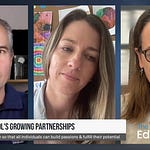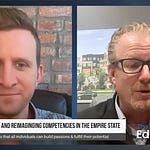Many schools struggle to create their master schedule each year. With dropping enrollments and a looming fiscal cliff, how schools use their teachers and classrooms will be even harder. I sat down with Paymon Rouhaniford, CEO of the startup Timely, to discuss how their tool can help schools schedule smarter and allow schools to focus on their highest priorities. As always, subscribers can listen, watch below, or read the transcript.
Time Topic
4:44 Timely’s origins
6:53 Elevating priorities with Timely
8:08 Camden as a case study
15:50 Unlocking possibilities with zero-based budgeting
18:11 The “how” of Timely
20:35 Adding complex criteria to the model
22:48 Budgeting post-ESSER
Michael Horn:
To help us think about some of the steps we can take to build a world in which all individuals can build their passions, fulfill their potential, and live a life of purpose, particularly as districts are staring at a fiscal cliff right in the face right now, is Paymon Rouhanifard. Paymon, it's so good to see you because we've talked the last few times on the phone, but not actually on video, so it's good to see you. Thanks for joining us.
Paymon Rouhanifard:
Thanks for having me.
Michael Horn:
So before we get into the company you've started, Timely, and some of the early successes that you've had and help our audience understand the problem. I’d just love you to talk about your own journey of educational entrepreneurship, and the work you've done in education and how you come to this current challenge and opportunity that you're seeking to help educators with.
Paymon Rouhanifard:
Yeah, it all really starts from lived experience. And so, I started my career as a 6th-grade teacher in New York City, drew some connections between what was happening inside of my school in West Harlem and the decisions the central office was making and wanted to be a part of those more systems-level solutions. And that led to a career working inside of districts. And so, I was in the Bloomberg administration working for Chancellor Joel Klein. We got termed out. I crossed the river into New Jersey, where I worked in Newark public schools, and ultimately became the superintendent of Camden, New Jersey. And Camden was a really formative experience. It was a school district that was put under state control right at the time I got appointed. I was the first superintendent appointed subsequent to that very fateful decision, and I was the 13th superintendent in the prior 20 years. So, there's just a lot of turmoil, a lot of turnover and confusion. And that experience, and I describe it as the best job I've ever had that I never want to have again, deeply shaped the work I'm doing today. And so immediately after I did that for five years, immediately after that experience, I started a nonprofit called Propel America, which is in a different space, but it speaks to a major pain point we felt in Camden, which is we increased the college matriculation rate, we changed the college going culture in Camden. There's a four year college pennant hanging in every classroom and hallway. I’m deeply proud of that fact, and at the same time, I saw a massive uptick in stopouts—students leaving traditional higher ed and entering the labor market with debt and little additional earning ability. And so, Propel America kind of drives a solution in that chasm of a challenge. And this is one I know you know quite well, kind of various hats you wear, Michael. We created a model called “jobs-first higher education,” which was intended to basically get young people into a living-wage job, but also the ability to get college credit so they could stack into a higher degree. So I did that for a few years, and then Timely. In Timely, the road goes back again to Camden. It was actually a board meeting I went to at the start of our first or second school year, and there were a lot of angry teachers in the room and some students and some parents. And I learned that we didn't stick the landing for scheduling. We didn't get scheduling right for one of our high schools, and students were in the cafeteria. There was a lot of confusion at the school, and I got under the hood of scheduling. First time, I was truly accountable for scheduling. And what I learned then was…I had sort of three aha moments. This obviously connects to Timely. The first was I couldn't believe how freaking hard scheduling was and just how complicated of a problem it is to solve. The second was I couldn't believe how few tools and solutions there were. So, there was really no sophisticated answer to the challenges that we were confronting. And so we were using Google Sheets and whiteboards and bulletin paper. And then third, just what a missed opportunity it was. Scheduling sits at this incredible intersection of the student and teacher experience, innovative staffing and budget solutions, and yet here we are, just, like, mousing around Google Sheets and whiteboarding our way to a schedule. And so that led me to this realization over time after I had left the Superintendency, that scheduling shouldn't have to be this process you suffer through and endure, but it should actually enable your core priorities.
Michael Horn:
Sorry, I'm just like still, there's so many places we could go in this conversation, because Propel America and the solution you built there, I think, was really ahead of its time in many ways. I'm just thinking also of all of the school districts now coming to this realization of, frankly, the lackluster results that so many colleges are getting for their students right. Even when they get them to college, as you started to do in Camden, and sort of what a visionary company that was. And it strikes me the Timely is much the same as you say it right. Like, the biggest use or sort of how we can impact the lives of students is through the use of time and people in ways that better get know the progress that they need to get done. So, let's dig deeper on what Timely is, then, against that problem that you observed in Camden when you were superintendent.
Paymon Rouhanifard:
Yeah. Our belief is that the master schedule should be the beating heart of a school. The way you use time and resources is as paramount of a decision as one can make as a systems leader, as a school-based leader. And instead, right now, the reality for most school leaders and for district administrators is you're just suffering through this process. You're just trying to get to the finish line. And generally, the starting point for most folks who are responsible for scheduling, they just roll over last year's schedule, which is understandable because there's a huge disincentive to recreate your schedule again because of how complicated it is. And when you're rolling over the schedule, that's how you can inadvertently calcify both inefficiencies and inequities. And so, the idea behind Timely is you should create a schedule that's aligned to your priorities, that enable your priorities, be they academic, budget and staffing. And to do that, you need a really sophisticated tool, a sophisticated set of supports, and there just really aren't many out there.
Michael Horn:
So how do you start with those? Because the big question there, right, is priorities and a school being clear about what those are. I can't tell you the number of district superintendents I meet with, and they're like, “These are our 20 priorities”. And I'm like, “If you have 20 priorities, you have none.” So how do you really help a district and their leadership team first figure out what is the core thing that we need to focus on?
Listen to this episode with a 7-day free trial
Subscribe to The Future of Education to listen to this post and get 7 days of free access to the full post archives.












